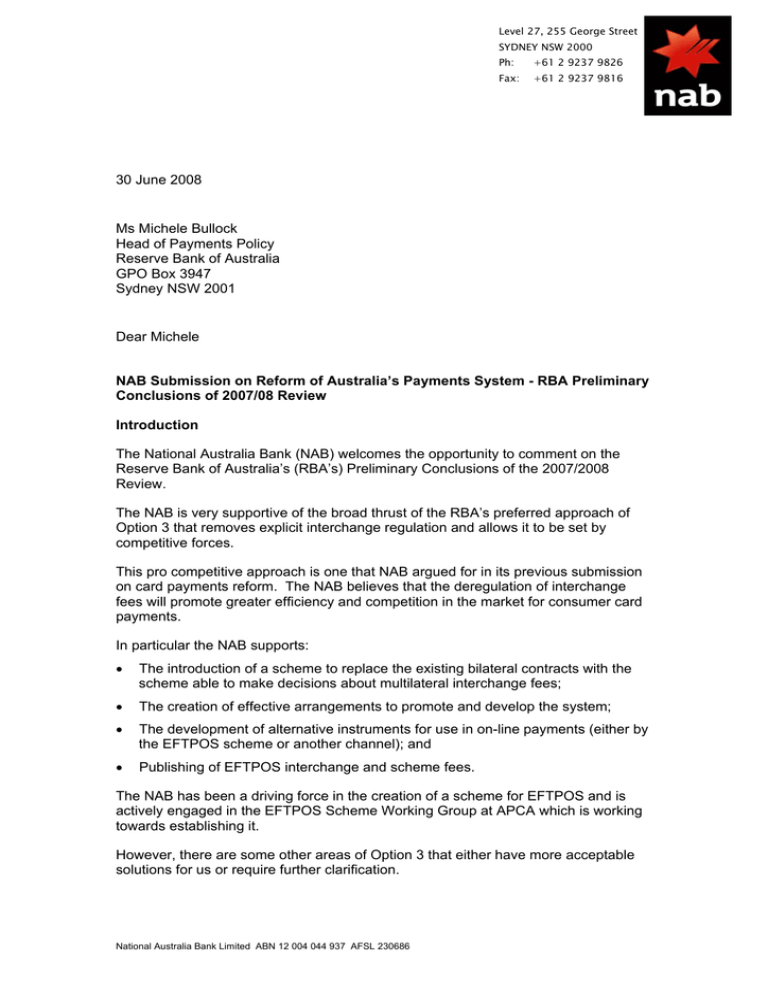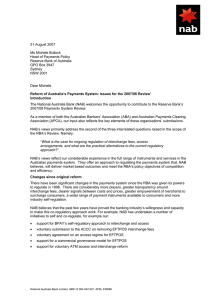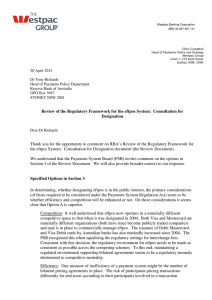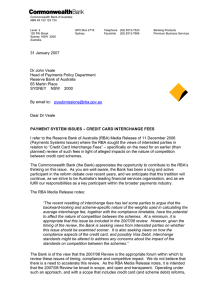Document 10818532
advertisement

Level 27, 255 George Street SYDNEY NSW 2000 Ph: +61 2 9237 9826 Fax: +61 2 9237 9816 30 June 2008 Ms Michele Bullock Head of Payments Policy Reserve Bank of Australia GPO Box 3947 Sydney NSW 2001 Dear Michele NAB Submission on Reform of Australia’s Payments System - RBA Preliminary Conclusions of 2007/08 Review Introduction The National Australia Bank (NAB) welcomes the opportunity to comment on the Reserve Bank of Australia’s (RBA’s) Preliminary Conclusions of the 2007/2008 Review. The NAB is very supportive of the broad thrust of the RBA’s preferred approach of Option 3 that removes explicit interchange regulation and allows it to be set by competitive forces. This pro competitive approach is one that NAB argued for in its previous submission on card payments reform. The NAB believes that the deregulation of interchange fees will promote greater efficiency and competition in the market for consumer card payments. In particular the NAB supports: • The introduction of a scheme to replace the existing bilateral contracts with the scheme able to make decisions about multilateral interchange fees; • The creation of effective arrangements to promote and develop the system; • The development of alternative instruments for use in on-line payments (either by the EFTPOS scheme or another channel); and • Publishing of EFTPOS interchange and scheme fees. The NAB has been a driving force in the creation of a scheme for EFTPOS and is actively engaged in the EFTPOS Scheme Working Group at APCA which is working towards establishing it. However, there are some other areas of Option 3 that either have more acceptable solutions for us or require further clarification. National Australia Bank Limited ABN 12 004 044 937 AFSL 230686 Concerns around any further Honour-All-Cards dilution The NAB does not support any further dilution of the Honour-All-Cards rule that would allow merchants to accept or reject cards based on whether they had separate interchange rates regardless of the card type, for example a premium card branded either Visa or MasterCard. The NAB believes that if this change is implemented it will have significant implications to all four parties involved in the transaction i.e. merchants, cardholders card issuers and acquirers. For Merchants, the “all or nothing” nature of differential acceptance poses significant costs and risks. It forces merchants into complex risk/return calculations where they have to decide whether selective acceptance and its potential fees savings will be offset by fewer sales. This approach has little flexibility for adjustment or fine-tuning. Cardholders would be presented with a much more complex and less attractive value proposition. It would result in confusion for them as they try to identify which merchants accepted their card, wasting time and effort in doing so. For issuers and acquirers the resulting cardholder confusion would result in a reduction of ubiquity of card acceptance and card brand damage. The NAB believes that differential surcharging is a superior practical alternative to any further dilution of the Honour-All-Cards rule in fostering competitive pressure on credit card interchange fees and, if priced correctly, will also send appropriate price signals to cardholders. The NAB has introduced this capability to the market place on one of its terminals and believes that the market and competitive forces are best positioned to determine the level of usage and benefit to merchants of this capability. For a significant number of its merchants, NAB’s merchant service fee pricing structure, which charges a different rate for premium cards, would allow merchants to benefit from using differential surcharging. EFTPOS scheme creation clarifications and issues The NAB believes that the RBA needs to explain what it is looking for with the request for further reform of access agreements over and above the reforms we have made to date, together with their rationale for it. Moreover, the NAB is of the view that for the sake of regulatory certainty and to ensure alignment of the expectations of both the RBA and the industry, the RBA needs to provide greater clarity as to what it sees as constituting effective competition and promotion of the EFTPOS scheme to avoid future intervention in interchange regulation. While we understand that this may be difficult to do in a quantitative sense, an attempt to do so on qualitative basis should be made. We believe this should be done together with the development of some high level milestones to ensure a mutually successful outcome for both the RBA and the industry. To achieve this, the NAB thinks that the RBA, the APCA EFTPOS Scheme Working Group and the industry in general should engage in some form of structured process. Page 2 of 3 While the NAB supports the change to multilateral interchange setting with the EFTPOS Scheme, we have significant concerns around scheme participant exposure to the Trade Practices Act that results from the RBA withdrawing their interchange standard and access regime cap for setting up new interchange links. The EFTPOS Scheme Working Group should also work with the RBA to find mutually acceptable ways to resolve the risks emanating from the above. NAB would welcome any support the RBA could give participants during this period. We would be more than pleased to discuss this further with you. Yours sincerely Steve Aliferis Regional General Manager Working Capital Services Andrew Maitland Regional General Manager Consumer Banking Solutions Page 3 of 3





